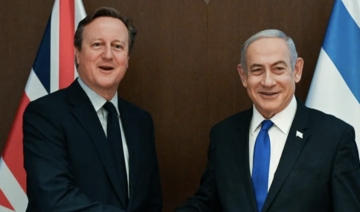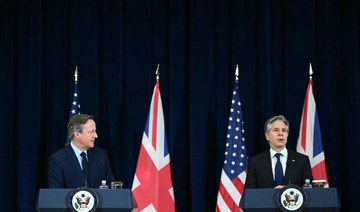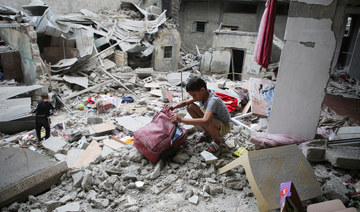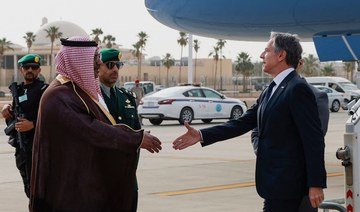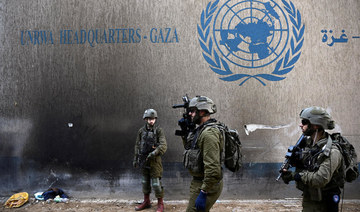JERUSALEM: An Israeli official on Sunday dismissed as “nonsense” an allegation by the Iranian foreign minister that Israel was trying to trick the United States into waging war on Iran.
It was Israel that needed to be on alert for possible Iranian strikes on the one-year anniversary on Sunday of the assassination of Tehran’s top general, Qassem Soleimani, in a US drone strike in Iraq, Energy Minister Yuval Steinitz said on Kan public radio.
Washington blames Iran-backed militia for regular rocket attacks on US facilities in Iraq, including near the US embassy. No known Iran-backed groups have claimed responsibility.
On Saturday, Iranian Foreign Minister Mohammad Javad Zarif said on Twitter: “New intelligence from Iraq indicate that Israeli agent-provocateurs are plotting attacks against Americans — putting an outgoing (President Donald) Trump in a bind with a fake casus belli.”
“Be careful of a trap, @realDonaldTrump. Any fireworks will backfire badly, particularly against your same BFFs,” Zarif wrote, in what appeared to be a veiled threat against Israel.
Steinitz said the remarks showed that Iran, after mounting US sanctions billed as curbing its nuclear program and involvement in regional conflict-zones, was “under pressure — economic pressure, and pressure in terms of national security.”
“We hear this nonsense by Zarif, that Israel would set off terrorist attacks against the United States — this really is total nonsense,” Steinitz told Kan public radio.
“But on the other hand it is a warning sign — a warning sign that Iran is taking aim at Israel, is looking for excuses to lash out at Israel, and therefore we need to have our finger on the pulse and be at the highest state of alert.”
The US military flew two nuclear-capable B-52 bombers to the Middle East in a message of deterrence to Iran on Wednesday, but the bombers have since left the region.
Interviewed separately on Kan, Israeli Culture Minister Chili Tropper, who like Steinitz sits in Prime Minister Benjamin Netanyahu’s security cabinet, confirmed media reports that Israel was on heightened alert for the Soleimani anniversary.
Asked what possible Iranian reprisals Israel was anticipating, Tropper said: “I cannot comment.”
Israel dismisses ‘nonsense’ Iran charge it seeks to trick US into war
https://arab.news/ctrwu
Israel dismisses ‘nonsense’ Iran charge it seeks to trick US into war
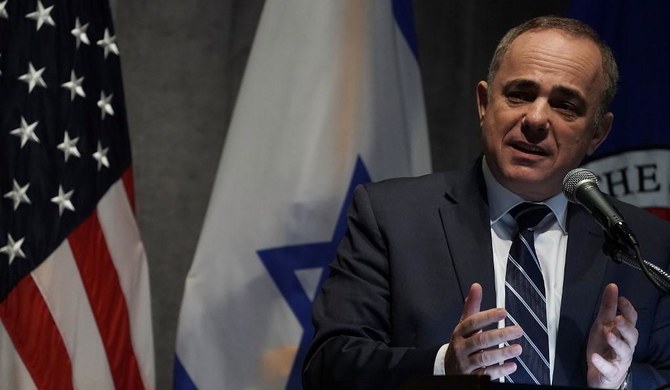
- Steinitz: It is Israel that needs to be on alert for possible Iranian strikes on the anniversary of Soleimani’s assassination
- He said Zarif's remarks on Twitter showed that Iran was under pressure in terms of national security
Hamas must accept truce deal and be removed from Gaza leadership, UK foreign secretary says
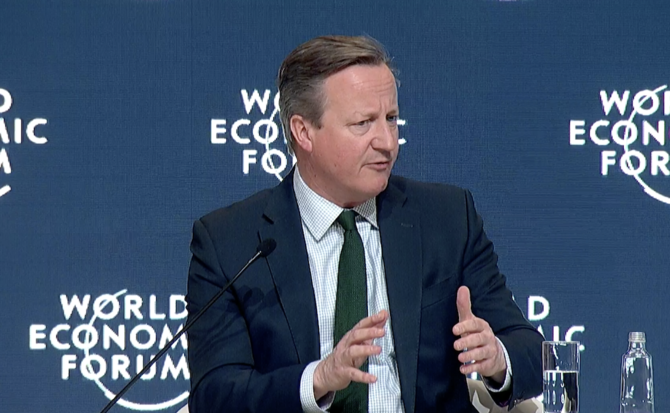
- ‘All the pressure of the world’ should be on militant group, David Cameron tells WEF Special Meeting in Riyadh
RIYADH: Hamas was urged on Monday by British Foreign Secretary David Cameron to accept an offer of a 40-day ceasefire and the release of “potentially thousands” of Palestinian prisoners in return for freeing Israeli hostages.
Speaking at a Special Meeting of the World Economic Forum in Riyadh, the former UK prime minister said the Palestinian militant group had been given “a very generous offer of sustained 40-day ceasefire, the release of potentially thousands of Palestinian prisoners, in return for the release of these hostages.”
A Hamas delegation is due in Egypt on Monday, where it is expected to respond to the latest proposal for a truce in Gaza and a release of hostages after almost seven months of war in the enclave, which broke out after militants killed nearly 1,200 people in southern Israel on Oct. 7.
“I hope Hamas do take this deal and, frankly, all the pressure in the world and all the eyes of the world should be on them today saying take that deal,” Cameron said, adding the proposal would lead to a “stop in the fighting that we all want to see so badly.”
Egypt, Qatar and the US have been trying to mediate an agreement between Israel and Hamas for months, but a flurry of diplomacy in recent days appeared to suggest a new push toward halting hostilities.
The UK foreign minister said that for Palestinian statehood to become a reality, there needed to be a wholesale change in thinking on both the Israeli and Palestinian side.
For a “political horizon for a two-state solution,” with an independent Palestine co-existing with Israel, the “people responsible for Oct. 7, the Hamas leadership, would have to leave Gaza and you’ve got to dismantle the terrorist infrastructure in Gaza,” he said.
“You’ve got to see a political future for the Palestinian people, but you’ve also crucially got to see security for Israel, and those two things have to go together,” he added.
Pakistani Prime Minister Shehbaz Sharif, who joined Cameron on the panel discussing what policymakers needed to do to rejuvenate global growth, went further and told the forum that the world could not focus on economic development unless it had peace.
“I want to make it very clear, the world will not be in peace unless there is a permanent peace in Gaza; I am speaking very frankly,” he said.
Sharif said the breakout of conflict between Russia and Ukraine had already given a warning of what conflict means for growth, adding that it caused commodity prices to skyrocket, inflation to soar, and impacted imports and exports of food and raw materials.
Saudi Arabia’s Minister of Economy and Planning, Faisal Alibrahim, echoed the Pakistani leader’s assertions, adding that current economic growth levels were lower than desired, and that increased productivity and global collaboration were the two keys to improving the situation.
“Productivity needs to see an upward shift,” he said. “We need to focus on the tools, the interventions, that will help us grow productivity.
“Secondly, (do we want) collaboration or fragmentation? A more fragmented world is a lower-growth world and with fragmentation comes a lot of cost. Without collaboration, we cannot achieve higher growth rates for the global economy.”
US, Britain urge Hamas to accept Israeli truce proposal
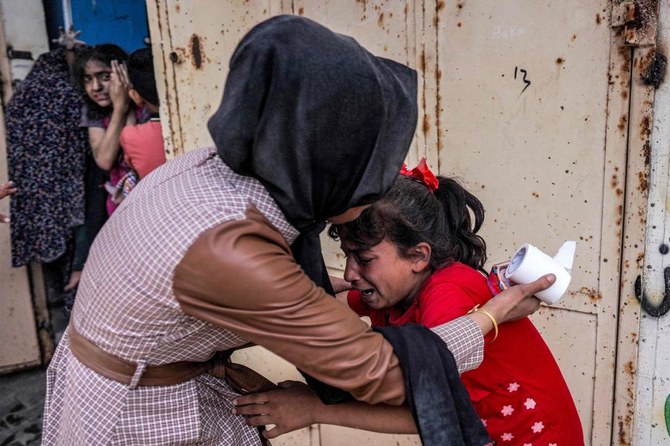
- “Hamas has before it a proposal that is extraordinarily, extraordinarily generous on the part of Israel,” Blinken said
- Britain’s Foreign Secretary David Cameron also described the Israeli proposal as “generous”
RIYADH: US Secretary of State Antony Blinken on Monday urged Hamas to swiftly accept an Israeli proposal for a truce in the Gaza war and the release of Israeli hostages held by the Palestinian group.
Hamas negotiators were expected to meet Qatari and Egyptian mediators in Cairo on Monday to deliver a response to the phased truce proposal which Israel presented at the weekend.
“Hamas has before it a proposal that is extraordinarily, extraordinarily generous on the part of Israel,” Blinken said at a meeting of the World Economic Forum in the Saudi capital Riyadh.
“The only thing standing between the people of Gaza and a ceasefire is Hamas. They have to decide and they have to decide quickly,” he said. “I’m hopeful that they will make the right decision.”
A source briefed on the talks said Israel’s proposal entailed a deal for the release of fewer than 40 of the roughly 130 hostages believed to be still held in Gaza in exchange for freeing Palestinians jailed in Israel.
A second phase of a truce would consist of a “period of sustained calm” — Israel’s compromise response to a Hamas demand for a permanent ceasefire.
A total of 253 hostages were seized in a Hamas attack on southern Israel on Oct. 7 in which about 1,200 Israelis were also killed, according to Israeli counts.
Israel retaliated by imposing a total siege on Gaza and mounting an air and ground assault that has killed about 34,500 Palestinians, according to Gaza health authorities.
Palestinians are suffering from severe shortages of food, fuel and medicine in a humanitarian crisis brought on by the offensive that has demolished much of the territory.
Britain’s Foreign Secretary David Cameron, who was also in Riyadh for the WEF meeting, also described the Israeli proposal as “generous.”
It included a 40-day pause in fighting and the release of potentially thousands of Palestinian prisoners as well as Israeli hostages, he told a WEF audience.
“I hope Hamas do take this deal and frankly, all the pressure in the world and all the eyes in the world should be on them today saying ‘take that deal’,” Cameron said.
Cameron is among several foreign ministers in Riyadh, including from the US, France, Jordan and Egypt, as part of a diplomatic push to bring an end to the Gaza war.
Only two states for Israel and Palestine can prevent all-out regional conflict: Egypt PM
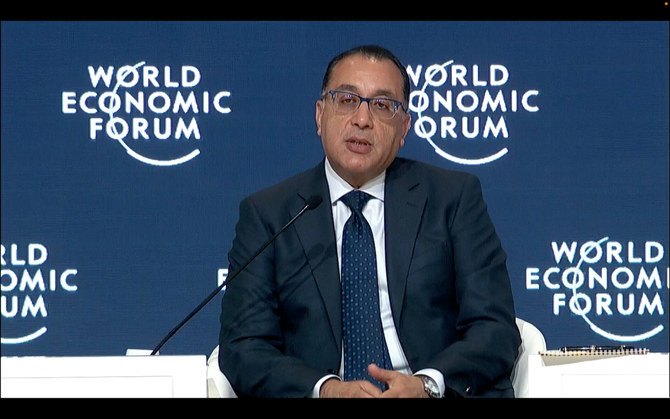
- Israel risking its future, says Egypt official at World Economic Forum
- Jordan’s PM also accuses Tel Aviv of not wanting ‘a political solution’
RIYADH: Only a two-state solution for Israel and Palestine can prevent the outbreak of an all-out regional and possible global conflict, said Egypt’s Prime Minister Mostafa Madbouli at the World Economic Forum here on Monday.
Participating in a panel discussion on Gaza, Madbouli said that if the current situation continues this would also affect the future of Israel.
“It is now or never, the whole world should unite to recognize the rights of Palestinians to have their own state. If you could imagine that postponing this will solve the problem, or will be in Israel’s interest, you are wrong. It will be against the future of Israel itself.”
He added: “We are speaking about a nation that has been under aggression and occupation for the past 75 years. Behind closed doors, everybody recognizes their right to exist, but when it comes to reality, and to have a solid solution, everybody is refraining.”
Madbouli said a two-state solution is the only remedy to achieve regional peace.
“It is today that we all have to push for a two-state solution, along with a serious regional solution. No one can imagine the situation if a regional war had to start. If you imagine that you are far then you are in a very elusive situation, everybody will be affected. We have already seen a sample of a war between Iran and Israel this month.”
Other panelists, including Jordan’s Prime Minister Bisher Al-Khasawneh and Sigrid Kaag, the UN humanitarian and reconstruction coordinator for Gaza, expressed their frustration with the situation on the ground.
Al-Khasawneh said: “This is indeed an extremely timely event, challenging and depressing. There are a lot of diplomatic activities underway, along with the continued Israeli aggression on Gaza and the potential for another catastrophic additional aggression on Rafah, which by all standards will be a catastrophe that adds on to a catastrophe that has led to conditions close to famine in Gaza.”
He said the damage caused by Israel’s campaign is estimated to be about $18.7 billion; and that the UN reports that 1.1 million children require psychological counseling.
Al-Khasawneh also called for a two-state solution: “Israel insists on making the same mistakes, and expecting different results, which is not engaging seriously in a political solution.”
He added: “The world seems to be falling into the trap of following the agenda of narrow-minded Israeli politicians, frankly speaking, and it is quite catastrophic. Today it is about the political calculations of some politicians in Israel at the expense of, the safety of Israelis, the safety of Jordanians, Egyptians, and all the Arabs. Today it’s the safety of the whole region and beyond.”
Kaag said a political solution has to be found. “If we look ahead, the reconstruction efforts, from an investment perspective, are all tied to the political parameters, the two-state solution.”
Kaag added: “The paradigm shift is in the now, but it’s also looking towards the future because of the level of destruction and despair, people there tell you that they feel like zombies. The mental health crisis is humongous. So, we need to create hope through investment, rehabilitation, and focus on the political effort. I think we failed the Palestinians countless times, and they deserve more human rights.”
Blinken ‘hopeful’ of Gaza ceasefire deal
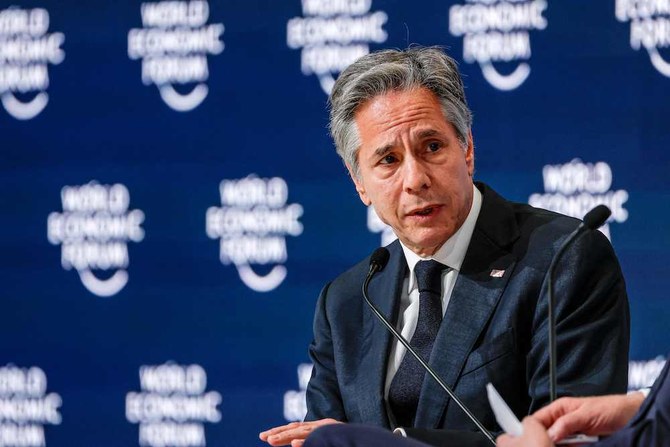
- Secretary of state confirms US opposition to Rafah incursion at WEF meeting in Riyadh
- Statement comes day after Palestinian President Abbas warns US ‘only country’ capable of averting catastrophe in Rafah
RIYADH: US Secretary of State Antony Blinken said he is hopeful Hamas will accept an “extraordinarily generous” ceasefire offer to stop Israel’s devastating Gaza offensive in return for the release of hostages.
“Hamas must decide, and decide quickly, whether to accept the extraordinarily generous offer for a ceasefire. I am hopeful they would make the right decision, and we can make a fundamental change in the dynamics,” the US official told a World Economic Forum panel in Riyadh.
A high-level Egyptian delegation flew in to Israel for talks last Friday amid a new diplomatic push for a truce in the six-month hostilities and the release of Israeli hostages held by the Palestinian militants.
The conflict in Gaza, which began following the Hamas-led assault on southern Israel on Oct. 7 last year, has resulted in the deaths of almost 35,000 Palestinians, mostly women and children, and reduced 75 percent of the besieged enclave into rubble according to authorities there.
“We are working with partners trying to bring the conflict to an end, trying to ensure it does not spread and all of it is a collective effort. The quickest way to bring the Gaza conflict to an end is to get to a ceasefire and the release of hostages,” Blinken said, as he thanked Egypt and Qatar for their instrumental role in pushing for a truce and the release of hostages.
Blinken also reiterated US opposition to an impending Israeli military operation in Gaza’s southernmost city of Rafah in the absence of a plan to ensure civilians will not be harmed.
“We have not yet seen a plan that gives us confidence that civilians can be effectively protected,” Blinken said.
Israel has for weeks threatened to launch an all-out offensive in Gaza to destroy Hamas’s remaining forces.
Palestinian President Mahmoud Abbas, who spoke during a WEF panel a day earlier, said the US “was the only country capable” of preventing Israel’s long-feared invasion of Rafah, where more than 1.5 million Palestinians are currently living.
Only a “small strike” on Rafah would force the Palestinian population to flee the Gaza Strip, and the “biggest catastrophe in the Palestinian people’s history would then happen,” Abbas said.
Blinken said there was a “need to be ready for a day-after plan for Gaza to include what is to be done about security, governance and administration and humanitarian and reconstruction needs.
“A lot of work has been done on that, more work needs to be done,” he said.
Blinken also said that the “single biggest rebuke to both Iran and Hamas would be Israel having normal relations with every country in the region and the realization of the Palestinian state.
“The US and Saudi Arabia have done intense work together over the past months to focus on the Saudi-Israeli normalization agreement. I think it is is potentially close to completion,” he said.
“But for the normalization to move forward … two things would be required: calm in Gaza and a credible pathway to a Palestinian state.”
Blinken earlier joined the opening of a US-Gulf Cooperation Council meeting, where he told the region’s foreign ministers that the best way to ease the humanitarian catastrophe in Gaza would be to negotiate a ceasefire agreement that would release hostages held by Hamas.
The top US diplomat met separately with Saudi Prince Faisal bin Farhan, minister of foreign affairs, where they reviewed ways to strengthen bilateral relations and joint cooperation in various fields, the Saudi Press Agency said.
Egypt ‘hopeful’ of new Israel-Hamas truce: foreign minister

- A Hamas delegation was due in Egypt on Monday, where it is expected to respond to Israel’s latest proposal for a truce in Gaza
Riyadh: Egypt’s foreign minister said he was “hopeful” about a new proposal for a truce in Gaza as a Hamas delegation was due in Cairo for talks on Monday.
“There is a proposal on the table (and it’s) up to the two sides to consider and accept,” Sameh Shoukry said in Riyadh at the World Economic Forum.
“We are hopeful,” he added, explaining that “the proposal has taken into account the positions of both sides and has tried to extract moderation.”
“We are waiting to have a final decision. There are factors that will have an impact on both side’s decisions, but I hope that all will rise to the occasion.”
Egypt, Qatar and the United States have been trying to mediate an agreement between Israel and Hamas for months, but a flurry of diplomacy in recent days appeared to suggest a new push toward halting the fighting.
A Hamas delegation was due in Egypt on Monday, where it is expected to respond to Israel’s latest proposal for a truce in Gaza and a release of hostages after almost seven months of war.
A senior Hamas official said on Sunday that the Palestinian group had no “major issues” with the most recent truce plan.
“The atmosphere is positive unless there are new Israeli obstacles,” the official told AFP, requesting anonymity to discuss the negotiations.





